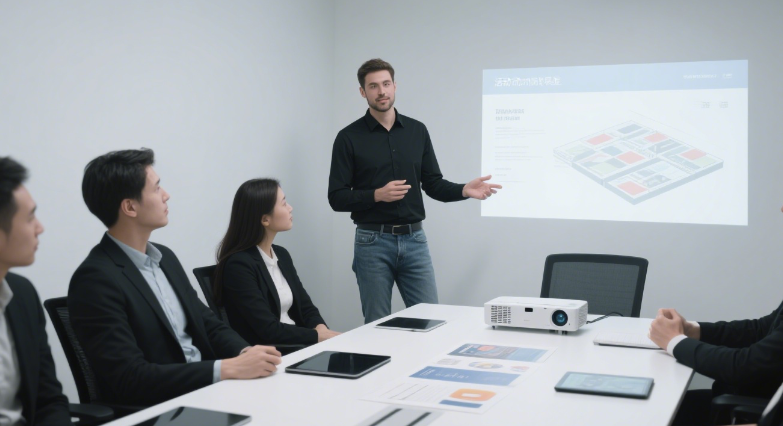Meeting Event Coordination: 3 Proven Strategies to Cure Boring, Overrunning Meeting
- DMX Editor

- Jul 24, 2025
- 3 min read
Is your meeting always "long and boring", with off-topic discussions, overtime but no results? In Hong Kong's workplace, the agenda design for cross-departmental coordination meetings and corporate strategy seminars is very important!
The quality of meeting time management directly determines whether the meeting is "productive and effective". From opening speeches, topic discussions to summarizing resolutions, omissions in each session may lead to low meeting efficiency.
For example, if you convene a quarterly strategy meeting for a Hong Kong multinational enterprise. If the agenda does not clearly list the key points for each business department's report, and instead focuses on trivial daily matters, it will consume a lot of time for participants. Take a forum organized by a Hong Kong industry association as another example, with many industry professionals and potential clients attending. If the agenda is loosely arranged and guest speakers often go overtime, it may cause the audience to leave midway, affecting the overall meeting effect.
In fact, the science of agenda planning lies behind every efficient meeting. The following practical strategies are a must-learn for meeting event coordinators! Let you easily create "zero-redundancy, high-yield" meetings!

Step 1 for Meeting Event Coordination: Clarify Meeting Objectives
The event coordination team should communicate with the corporate client to understand the core purpose of the meeting (decision-making, discussion, training, communication). If there are multiple objectives, analyze their importance to prioritize subsequent planning.
Sometimes, you may communicate with the HR or admin department, who might not fully express the senior management's goals. It is recommended to analyze participants' needs—such as executives focusing on decision outcomes and department representatives caring about resource coordination—and then confirm with the contact person.
2. Meeting Agenda Design Skills
2.1 Agenda Structure: Must-Have Flow
Subsequent coordination steps require the agenda to include:
Opening session: Host's speech, meeting background (5-10 minutes)
Core topics: Arranged logically with time limits for each
Closing session: Summary, resolutions, and assigned responsibilities
2.2 Time Allocation: Prioritize Key Topics
To save time, allocate time based on topic importance (e.g., key topics account for 60% of total time). Appoint a "time reminder" to count down for each session, as individuals often struggle to estimate time. Remind participants to control time and pre-brief key information before the meeting.
2.3 Interactive Sessions: Avoid Boredom
Incorporate Q&A, group discussions, or voting to energize the audience. However, control the duration and pre-design guiding questions. If time is tight, the host should proactively wrap up and move to the next session.
3. Execution Phase: Focus on Time Management
3.1 Pre-Meeting Preparation: Establish Time Awareness To enhance efficiency:
Send an agenda draft to participants via email at least 3-5 working days in advance, with the subject line indicating the meeting theme, date, and "Draft for Comments" (e.g., "[202X Q3 Business Meeting] Agenda Draft (For Comments)").
Specify a feedback deadline (e.g., 2 days before the meeting) in the email.
Organize a rehearsal to familiarize the team with the 流程. Send a reminder via SMS or IM (e.g., WhatsApp, WeChat) 1 day before.
The logistics team should contact audio, projector, and LED wall suppliers in advance to confirm prices and service details.
3.2 On-Site Control: Host as the Frontline Leader
While the event coordinator acts as the behind-the-scenes director, the host strictly manages time, intervening in overtime speeches. For urgent ad-hoc topics, the coordinator should consult the client before adding them to the agenda.
Pre-meeting reminder: 5 minutes before the start, the host asks attendees to mute their phones. The opening speech (1-2 minutes) emphasizes meeting goals, agenda, and rules.
Agenda propulsion: Strictly follow the timeline (e.g., "Next is Topic 2—New Product Marketing Plan Discussion, 30 minutes total.").
Discussion guidance: When off-topic, the host redirects (e.g., "The technical issue is important, but let's focus on market needs first. Technical details can be discussed in a separate tech seminar later—agreed?").
Overtime handling: Politely but firmly interrupt speakers who exceed time limits.
Time-saving measures: If falling behind, propose simplifying discussions.
3.3 Post-Meeting Follow-Up: Continuous Improvement
Assign a professional recorder with a voice recorder or camera.
The recorder should compile meeting minutes, clarifying timelines for each decision.
After the event, the coordinator should organize a debriefing to analyze time efficiency and identify areas for improvement.
Recommended Professional Event Coordination Teams
DMX, a professional Hong Kong event coordination company, transforms your vision into unforgettable experiences. From corporate gatherings to personal celebrations, DMX's expert team controls every detail with precision and creativity, delivering innovative solutions and exceptional service.
Consult for event coordination solutions: https://www.dmxhk.com/


